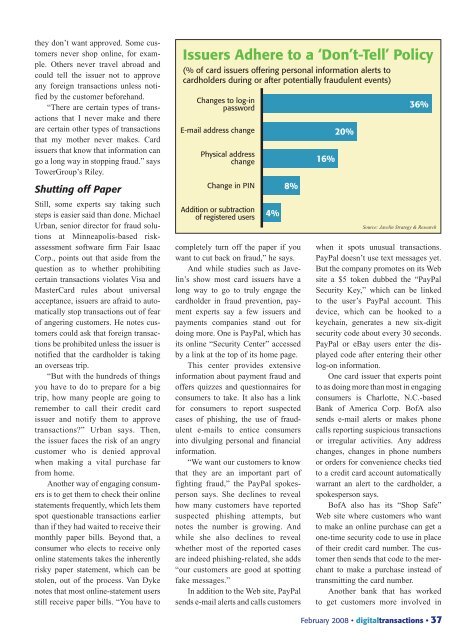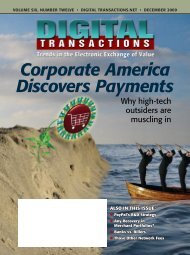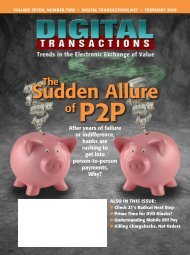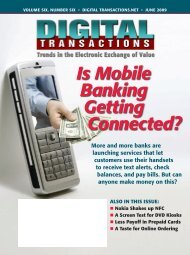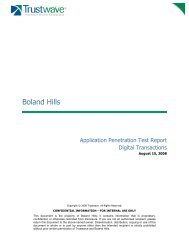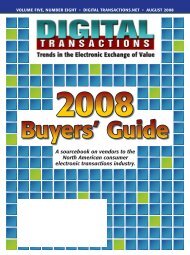The Broken Link - Digital Transactions
The Broken Link - Digital Transactions
The Broken Link - Digital Transactions
Create successful ePaper yourself
Turn your PDF publications into a flip-book with our unique Google optimized e-Paper software.
they don’t want approved. Some customers<br />
never shop online, for example.<br />
Others never travel abroad and<br />
could tell the issuer not to approve<br />
any foreign transactions unless notified<br />
by the customer beforehand.<br />
“<strong>The</strong>re are certain types of transactions<br />
that I never make and there<br />
are certain other types of transactions<br />
that my mother never makes. Card<br />
issuers that know that information can<br />
go a long way in stopping fraud.” says<br />
TowerGroup’s Riley.<br />
Issuers Adhere to a ‘Don’t-Tell’ Policy<br />
(% of card issuers offering personal information alerts to<br />
cardholders during or after potentially fraudulent events)<br />
Changes to log-in<br />
password<br />
E-mail address change<br />
Physical address<br />
change<br />
16%<br />
20%<br />
36%<br />
Shutting off Paper<br />
Change in PIN<br />
8%<br />
Still, some experts say taking such<br />
steps is easier said than done. Michael<br />
Urban, senior director for fraud solutions<br />
at Minneapolis-based riskassessment<br />
software firm Fair Isaac<br />
Corp., points out that aside from the<br />
question as to whether prohibiting<br />
certain transactions violates Visa and<br />
MasterCard rules about universal<br />
acceptance, issuers are afraid to automatically<br />
stop transactions out of fear<br />
of angering customers. He notes customers<br />
could ask that foreign transactions<br />
be prohibited unless the issuer is<br />
notified that the cardholder is taking<br />
an overseas trip.<br />
“But with the hundreds of things<br />
you have to do to prepare for a big<br />
trip, how many people are going to<br />
remember to call their credit card<br />
issuer and notify them to approve<br />
transactions?” Urban says. <strong>The</strong>n,<br />
the issuer faces the risk of an angry<br />
customer who is denied approval<br />
when making a vital purchase far<br />
from home.<br />
Another way of engaging consumers<br />
is to get them to check their online<br />
statements frequently, which lets them<br />
spot questionable transactions earlier<br />
than if they had waited to receive their<br />
monthly paper bills. Beyond that, a<br />
consumer who elects to receive only<br />
online statements takes the inherently<br />
risky paper statement, which can be<br />
stolen, out of the process. Van Dyke<br />
notes that most online-statement users<br />
still receive paper bills. “You have to<br />
Addition or subtraction<br />
of registered users<br />
4%<br />
completely turn off the paper if you<br />
want to cut back on fraud,” he says.<br />
And while studies such as Javelin’s<br />
show most card issuers have a<br />
long way to go to truly engage the<br />
cardholder in fraud prevention, payment<br />
experts say a few issuers and<br />
payments companies stand out for<br />
doing more. One is PayPal, which has<br />
its online “Security Center” accessed<br />
by a link at the top of its home page.<br />
This center provides extensive<br />
information about payment fraud and<br />
offers quizzes and questionnaires for<br />
consumers to take. It also has a link<br />
for consumers to report suspected<br />
cases of phishing, the use of fraudulent<br />
e-mails to entice consumers<br />
into divulging personal and financial<br />
information.<br />
“We want our customers to know<br />
that they are an important part of<br />
fighting fraud,” the PayPal spokesperson<br />
says. She declines to reveal<br />
how many customers have reported<br />
suspected phishing attempts, but<br />
notes the number is growing. And<br />
while she also declines to reveal<br />
whether most of the reported cases<br />
are indeed phishing-related, she adds<br />
“our customers are good at spotting<br />
fake messages.”<br />
In addition to the Web site, PayPal<br />
sends e-mail alerts and calls customers<br />
Source: Javelin Strategy & Research<br />
when it spots unusual transactions.<br />
PayPal doesn’t use text messages yet.<br />
But the company promotes on its Web<br />
site a $5 token dubbed the “PayPal<br />
Security Key,” which can be linked<br />
to the user’s PayPal account. This<br />
device, which can be hooked to a<br />
keychain, generates a new six-digit<br />
security code about every 30 seconds.<br />
PayPal or eBay users enter the displayed<br />
code after entering their other<br />
log-on information.<br />
One card issuer that experts point<br />
to as doing more than most in engaging<br />
consumers is Charlotte, N.C.-based<br />
Bank of America Corp. BofA also<br />
sends e-mail alerts or makes phone<br />
calls reporting suspicious transactions<br />
or irregular activities. Any address<br />
changes, changes in phone numbers<br />
or orders for convenience checks tied<br />
to a credit card account automatically<br />
warrant an alert to the cardholder, a<br />
spokesperson says.<br />
BofA also has its “Shop Safe”<br />
Web site where customers who want<br />
to make an online purchase can get a<br />
one-time security code to use in place<br />
of their credit card number. <strong>The</strong> customer<br />
then sends that code to the merchant<br />
to make a purchase instead of<br />
transmitting the card number.<br />
Another bank that has worked<br />
to get customers more involved in<br />
February 2008 • digitaltransactions • 37


